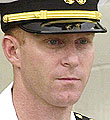 Greeneville skipper apologizes to families of victims Greeneville skipper apologizes to families of victims
 Admirals try to reconcile crew, collision Admirals try to reconcile crew, collision
 Navy told of chances to raise Ehime Maru from ocean floor Navy told of chances to raise Ehime Maru from ocean floor
 Investigator urges improvements in subs' ability to rescue Investigator urges improvements in subs' ability to rescue
 A Tribute to the Missing A Tribute to the Missing
 Previous stories Previous stories
 See KHON-TV video of families' reaction to Waddle apology, available in low and high bandwidth format. RealPlayer is required. See KHON-TV video of families' reaction to Waddle apology, available in low and high bandwidth format. RealPlayer is required.
By Mike Gordon
and Susan Roth
Advertiser Staff Writers
In four days of testimony, every damaging revelation at the court of inquiry has prompted this unspoken question: Would the former captain of the USS Greeneville ultimately take the witness stand to give his version of events?
But Cmdr. Scott Waddle, who was relieved of his command one day after the Feb. 9 collision with the Ehime Maru, has requested "testimonial immunity," a legal move that would prevent his testimony from being used against him later.
Waddle requested immunity a week ago. A day later, Lt. j.g. Michael Coen, the officer of the deck on the Greeneville during the collision, made the same request. Adm. Thomas Fargo, commander of the U.S. Pacific Fleet, has not decided whether to grant either request. It was Fargo who convened the rarely used court of inquiry now investigating the accident.
 |
| Lt. Cmdr. Gerald Pfeifer, the Greeneville's executive officer, has not requested immunity.
Richard Ambo • The Honolulu Advertiser |
Waddle, Coen and a third Greeneville officer, Lt. Cmdr. Gerald Pfeifer, are the focus of the inquiry. Pfeifer has not requested immunity. His testimony could be used against his shipmates. He is expected to take the witness stand later in the inquiry.
In addition to Pfeifer’s expected testimony, all other revelations that come out during the trial could be used against the two men even if they receive immunity for their statements, said Capt. Joe Scranton, a spokesman for the Judge Advocate General Corps, the legal arm of the Navy. Both officers could still be court-martialed, Scranton said.
Fargo can decide the matter at any time during the trial, expected to last three to four weeks.
"I would imagine he would wait to see if he’ll even need the testimony," Scranton said.
"Granting the immunity may limit the court’s options later. What if something comes out later that’s startling and they can’t pursue it? It’s more difficult for any prosecutor to work with testimonial immunity."
Capt. Kevin Wensing, a Navy spokesman, said yesterday that Fargo has yet to determine whether the testimony offered by Waddle and Coen is essential to the case.
In addition, Wensing said that even if Waddle gets immunity from prosecution, it’s still possible that he may not testify at the court of inquiry. He is not expected to take the witness stand until toward the end of the trial.
A military law expert attending the inquiry said the immunity request is a smart move.
"It’s unusual, but it is a good defense tactic," said Jay Fidell, a former Coast Guard lawyer and court of inquiry investigator.
Fidell said he doubts the request will be granted, but there is always a chance, something that Waddle’s attorney, Charles Gittins, is aware of, he said. At several points during his cross-examination of the admiral who authored the preliminary investigation, Gittins has asked if the court would be helped by his client’s testimony.
Every response from Rear Adm. Charles Griffiths Jr. was yes.
"It’s a campaign to bring pressure on the convening authority" to grant immunity, Fidell said. "It could happen if the command is really, really interested in knowing what happened."
Without immunity, Waddle could take the stand, but Fidell said he wouldn’t advise it. The court has been too interested, so far, in the series of errors that may have contributed to the deadly collision.
Waddle and Coen could choose to testify or invoke the Fifth Amendment that protects against self-incrimination. Either man also could submit an unsworn written statement.
"It would be sanitized," Fidell said. "It won’t incriminate them. It will read like poetry."
[back to top] |

